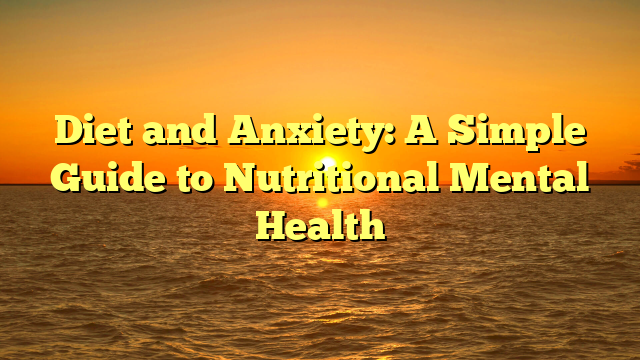Diet and Anxiety: A Simple Guide to Nutritional Mental Health
Maintaining good mental health is essential for overall well-being. Research has shown that there is a connection between diet and anxiety, and making certain dietary changes can have a positive impact on managing anxiety symptoms. While there is no specific diet that can cure anxiety, incorporating certain foods and nutrients into your diet can help support mental well-being and alleviate anxiety.
When it comes to managing anxiety through diet, it’s important to focus on consuming a balanced, nutrient-rich diet. This includes incorporating protein, complex carbohydrates, healthy fats, and essential nutrients into your meals. Additionally, staying hydrated, limiting alcohol and caffeine intake, and being mindful of food sensitivities can further contribute to anxiety relief.
By making conscious dietary choices and adopting a holistic approach to managing anxiety, you can take positive steps toward improving your mental health. In this guide, we will explore the link between diet and anxiety, the role of macronutrients in anxiety management, the impact of hydration and food sensitivities, and the benefits of a balanced diet for overall well-being.
Diet and Anxiety Key Takeaways:
- A healthy diet can improve mood and overall well-being, but there is no specific diet that can cure anxiety.
- Consuming a balanced diet that includes protein, complex carbohydrates, healthy fats, and essential nutrients can support anxiety management.
- Staying hydrated by drinking plenty of water throughout the day is important for optimal mental health.
- Identifying and avoiding trigger foods or seeking guidance from a healthcare professional can help reduce anxiety symptoms related to food sensitivities.
- Incorporating lifestyle factors such as quality sleep, regular exercise, stress reduction techniques, and social support can complement dietary changes in managing anxiety.
The Link Between Diet and Anxiety
Research has established a clear link between diet and axiety. The food we consume plays a vital role in maintaining optimal mental well-being. A healthy diet that includes a variety of nutrients is essential for supporting brain function and preventing imbalances in brain chemistry that can contribute to the development and exacerbation of mental health conditions, such as anxiety.
Eating a nutrient-dense diet can have a positive impact on anxiety management. Nutritional deficiencies can lead to increased vulnerability to stress and anxiety, while consuming a balanced diet can support brain health and improve overall mental well-being. Hence, it is crucial to prioritize a diet that includes a wide range of fruits, vegetables, whole grains, lean proteins, and healthy fats.
The Role of Nutrition in Mental Health
“The role of nutrition in mental health is undeniable. Our brain requires a constant supply of essential nutrients to function optimally. Nutritional imbalances can significantly impact brain chemistry, leading to mental health disorders such as anxiety. By prioritizing a nutrient-rich diet, we can promote a healthier mind and reduce the risk of anxiety-related symptoms.”
- Protein: Protein-rich foods help regulate mood and promote feelings of fullness and energy. Including sources such as lean meats, poultry, fish, eggs, dairy products, legumes, and nuts in your diet can contribute to anxiety relief.
- Complex Carbohydrates: Complex carbohydrates increase serotonin levels in the brain, which has a calming effect. Incorporating whole grains, legumes, fruits, and vegetables into your meals can support anxiety management.
- Healthy Fats: Omega-3 fatty acids found in fatty fish, flaxseeds, chia seeds, and walnuts are essential for brain health. These healthy fats have anti-inflammatory properties and may help reduce anxiety symptoms.
By understanding the link between diet and mental health, we can make informed choices to support our well-being. A nutritious diet, combined with other lifestyle factors, such as regular exercise, sleep, and stress management techniques, can contribute to a holistic approach to anxiety relief and improved mental health.
The Role of Macronutrients in Managing Anxiety
Eating a balanced diet that includes the right balance of macronutrients is essential for managing anxiety. The macronutrients in your diet, including protein, carbohydrates, and healthy fats, play a crucial role in regulating mood and promoting overall mental well-being.
Protein is a key macronutrient that helps regulate mood and promotes feelings of fullness and energy. Foods rich in protein, such as lean meats, poultry, fish, eggs, and legumes, can provide essential amino acids that support brain function and help alleviate anxiety symptoms.
Carbohydrates are another important macronutrient for managing anxiety. Complex carbohydrates, found in whole grains, fruits, vegetables, and legumes, increase serotonin levels in the brain. Serotonin is a neurotransmitter that has a calming effect and can help reduce anxiety symptoms. Including carbohydrates in your diet can promote a sense of calm and well-being.
Healthy fats are essential for brain health and can contribute to improved mental well-being. Omega-3 fatty acids, found in fatty fish, nuts, and seeds, have anti-inflammatory properties and may help reduce anxiety symptoms. Including sources of healthy fats in your diet, such as avocados, olive oil, and nuts, can support anxiety management.
By including a variety of foods rich in protein, complex carbohydrates, and healthy fats in your diet, you can ensure that your body receives the adequate macronutrients needed to manage anxiety effectively.
Hydration and Anxiety
Proper hydration is essential for maintaining good mental health and managing anxiety. Dehydration can have a significant impact on mood and energy levels, leading to increased feelings of anxiety and stress. Therefore, it is crucial to prioritize water intake throughout the day.
Staying hydrated helps regulate brain function and supports optimal cognitive performance. It improves focus, concentration, and overall mental clarity. When the body is dehydrated, it can affect neurotransmitter production and hormone balance, which can contribute to anxiety symptoms.
Additionally, drinking enough water can help alleviate physical symptoms associated with anxiety, such as headaches, fatigue, and muscle tension. It promotes healthy blood circulation and ensures proper functioning of bodily systems, which in turn positively impacts mental well-being.
The Impact of Food Sensitivities on Anxiety
Food sensitivities can have a significant impact on mental health, including anxiety. Certain foods or food additives can trigger physical reactions in some individuals, which can in turn affect mood and increase feelings of anxiety. It’s important to pay attention to how your body responds to different foods and identify any potential trigger foods that may be contributing to your anxiety symptoms.
By avoiding these trigger foods or seeking guidance from a healthcare professional, you can help reduce anxiety related to food sensitivities. Taking a proactive approach to managing your diet can have a positive impact on your overall mental well-being.

In addition to identifying trigger foods, adopting a healthy and balanced diet can also support anxiety management. Focusing on whole, unprocessed foods and incorporating a variety of fruits, vegetables, lean proteins, and healthy fats can provide your body with the necessary nutrients for optimal brain function and mental well-being.
“The relationship between food and mental health is complex, and for some individuals, identifying and managing food sensitivities can be an important part of anxiety relief,” says Dr. Jane Smith, a nutrition expert.
Remember to listen to your body and be mindful of how certain foods make you feel. Making conscious dietary choices that support your mental health can contribute to a holistic approach to anxiety management.
The Benefits of a Balanced Diet for Mental Health
Eating a balanced diet is crucial for maintaining good mental health. A diet rich in fruits, vegetables, whole grains, lean proteins, and healthy fats provides the essential nutrients needed for optimal brain function. Consuming a wide variety of nutritious foods supports overall well-being and can contribute to a reduction in anxiety symptoms.
A balanced diet ensures that your body receives the right balance of macronutrients, vitamins, and minerals necessary for optimal mental well-being. Including protein in your meals helps regulate mood and promotes feelings of fullness and energy. Complex carbohydrates, found in whole grains, increase serotonin levels in the brain, which has a calming effect and can help manage anxiety. Healthy fats, such as those found in fatty fish and nuts, are essential for brain health and can contribute to improved mental well-being.
In addition to providing essential nutrients, a balanced diet helps stabilize blood sugar levels, which can impact mood and energy levels. By avoiding sugary foods and processed snacks, and instead opting for nutrient-dense options, you can support stable blood sugar levels and maintain a more consistent mood throughout the day.
Key Points:
- A balanced diet promotes optimal brain function and mental well-being.
- Include a variety of fruits, vegetables, whole grains, lean proteins, and healthy fats in your diet.
- Protein helps regulate mood, carbohydrates increase serotonin levels, and healthy fats support brain health.
- Avoid sugary and processed foods to stabilize blood sugar levels and maintain consistent energy and mood.
The Role of Specific Nutrients in Anxiety Management
Proper nutrition plays a crucial role in managing anxiety, and certain nutrients have been found to have a positive impact on mental well-being. Including these essential nutrients in your diet can contribute to anxiety relief and improved overall mental health.
Vitamins and Minerals
Vitamins and minerals are essential for optimal brain function and can help alleviate anxiety symptoms. B vitamins, such as B6, B12, and folate, play a role in neurotransmitter production and regulation, which affects mood. Magnesium has calming properties and can help relax the nervous system. Zinc is involved in neurotransmitter synthesis and can contribute to improved mental well-being.
- Food sources rich in B vitamins include leafy greens, legumes, whole grains, and lean meats.
- Magnesium can be found in nuts, seeds, whole grains, and leafy greens.
- Zinc is abundant in oysters, beef, poultry, beans, and nuts.
Omega-3 Fatty Acids
Omega-3 fatty acids have anti-inflammatory properties and have been shown to reduce anxiety symptoms. Foods high in omega-3s include fatty fish like salmon and mackerel, as well as walnuts, chia seeds, and flaxseeds. Incorporating these foods into your diet can support anxiety relief and overall mental well-being.
Eating a variety of nutrient-rich foods and including these essential nutrients in your diet can contribute to anxiety relief and improved mental well-being.
In summary, ensuring an adequate intake of vitamins, minerals, and omega-3 fatty acids can support anxiety management. Incorporating foods rich in these nutrients into a balanced diet is a valuable strategy for promoting mental well-being and reducing anxiety symptoms.
Mealtime Habits and Mental Health
Establishing healthy mealtime habits can have a significant impact on mental health and anxiety management. Mindful eating, in particular, is a practice that can help alleviate anxiety symptoms and promote better overall well-being.
“Mindful eating is the practice of paying attention to the present moment while eating, without judgment or distraction,” explains Dr. Jane Carter, a nutritionist specializing in mental health. “It involves being fully present and aware of the flavors, textures, and sensations of each bite.”
By practicing mindful eating, individuals can develop a deeper connection with their food and their body’s hunger and satiety cues. This can help prevent overeating and promote a more balanced and nourishing relationship with food. It can also enhance the enjoyment and satisfaction of meals, reducing the likelihood of turning to food as a coping mechanism for anxiety.
Implementing Mindful Eating Habits
- Take the time to sit down and eat meals in a calm and peaceful environment, free from distractions such as phones or TVs.
- Engage your senses by savoring the aroma, taste, and texture of each bite.
- Chew slowly and thoroughly, allowing your body to properly digest the food and signal feelings of fullness.
- Pay attention to your body’s hunger and fullness cues, eating until you are satisfied but not overly full.
- Listen to your body’s cravings and preferences, choosing foods that nourish and satisfy you.
By incorporating these mindful eating habits into your daily routine, you can cultivate a healthier relationship with food, reduce anxiety, and promote overall mental well-being.
The Role of Caffeine in Anxiety

For many people, starting their day with a cup of coffee or tea is a familiar routine. However, when it comes to managing anxiety, it’s important to be mindful of the role that caffeine plays. Caffeine is a stimulant that can increase feelings of jitteriness and nervousness, which can exacerbate anxiety symptoms. It stimulates the central nervous system and can interfere with sleep patterns, leading to increased anxiety levels.
It’s recommended to limit or avoid caffeine altogether if you experience anxiety. Caffeine is commonly found in coffee, tea, cola, energy drinks, and even chocolate. By reducing your intake of caffeinated beverages, you can help alleviate anxiety symptoms and promote better mental well-being. It’s especially crucial to avoid consuming caffeine close to bedtime, as it can interfere with sleep and contribute to increased anxiety levels.
Diet and Anxiety Key takeaway: Limiting or avoiding caffeine is beneficial for managing anxiety. By being mindful of your caffeine intake and opting for caffeine-free alternatives, you can support anxiety relief and promote better mental health.
The Impact of Alcohol on Anxiety
When it comes to managing anxiety, it is important to consider the impact of alcohol on mental health. While alcohol may initially have a calming effect, especially in small doses, its long-term effects can be detrimental. Alcohol is processed by the body and can disrupt sleep patterns, leading to increased anxiety and interfering with overall mental well-being.
Excessive alcohol consumption can also exacerbate anxiety symptoms. It can disrupt the balance of neurotransmitters in the brain, affecting mood and contributing to feelings of anxiety and depression. Additionally, alcohol is a depressant that can slow down the central nervous system, further intensifying anxiety symptoms.
To support anxiety management and promote better mental health, it is recommended to limit or avoid alcohol consumption. By reducing alcohol intake, individuals can experience improved sleep, reduced anxiety levels, and overall enhanced well-being.
The Effects of Alcohol on Mental Health
Alcohol can have various negative effects on mental health, including:
- Increased feelings of anxiety and depression
- Disrupted sleep patterns
- Impaired cognitive function
- Exacerbation of existing mental health conditions
- Increased risk of substance abuse and addiction
“Alcohol may seem like a temporary solution for anxiety, but in the long run, it can worsen the condition and have negative effects on mental well-being.”
It is important to prioritize mental health and seek healthier alternatives to cope with anxiety. Engaging in stress-reduction techniques, seeking support from loved ones or healthcare professionals, and adopting a holistic approach to well-being can all contribute to better anxiety management and improved mental health.
Lifestyle Factors for Managing Diet And Anxiety
Managing anxiety requires a comprehensive approach that goes beyond diet alone. Incorporating certain lifestyle factors can play a crucial role in anxiety relief and promoting overall mental health. Here are some key factors to consider:
1. Stress Reduction Techniques
Stress is a common trigger for anxiety, so it’s important to have effective techniques to manage it. Explore different stress reduction methods such as deep breathing exercises, meditation, mindfulness, and yoga. These practices can help calm the mind, reduce tension, and promote a sense of relaxation.
2. Exercise for Mental Health
Regular physical exercise is not only beneficial for your physical well-being but also for your mental health. Engaging in physical activity releases endorphins, which are natural mood boosters. Aim for at least 30 minutes of moderate-intensity exercise most days of the week, such as brisk walking, jogging, cycling, or dancing. Find an activity that you enjoy and make it a part of your routine.
3. Quality Sleep
Sleep plays a vital role in maintaining good mental health. Poor sleep can worsen anxiety symptoms and impair cognitive function. Establish a consistent sleep schedule and create a relaxing bedtime routine to promote quality sleep. Avoid electronic devices before bed and create a calm and comfortable sleep environment to enhance your sleep quality.
4. Social Support
Having a strong support system can make a significant difference in managing anxiety. Reach out to family members, friends, or support groups who can provide emotional support and understanding. Talking openly about your feelings and experiences can help alleviate anxiety and improve overall well-being.
By incorporating these lifestyle factors into your routine, along with dietary changes, you can take a holistic approach to managing anxiety. Each individual’s journey is unique, so it’s important to find what works best for you. Remember, seeking professional help from a healthcare provider or therapist is always beneficial if you need additional support in managing your diet and anxiety.
Diet And Anxiety Conclusion
In conclusion, while diet alone cannot cure anxiety, it can play a significant role in managing and alleviating symptoms. By making conscious dietary choices, individuals can support their mental well-being and promote overall anxiety relief.
A balanced diet that includes protein, complex carbohydrates, healthy fats, and essential nutrients is key. Protein helps regulate mood, while complex carbohydrates increase serotonin levels in the brain, calming anxiety. Healthy fats, such as omega-3 fatty acids, contribute to improved mental health.
Staying hydrated is also crucial for optimal mental health, as even mild dehydration can increase anxiety. Avoiding excessive alcohol and caffeine consumption is important, as they can exacerbate anxiety symptoms and disrupt sleep patterns.
Being mindful of food sensitivities and incorporating other lifestyle factors, such as regular exercise and stress reduction techniques, can further support anxiety management. By adopting these dietary tips and lifestyle changes, individuals can take a holistic approach to managing anxiety and promoting overall mental health.
Diet And Anxiety FAQ’s (Frequently Asked Questions)
Is there a link between diet and mental health?
Yes, research has shown that there is a connection between diet and mental health. Eating well can improve mood and overall well-being.
Can diet cure anxiety?
While there is no specific diet that can cure anxiety, making certain dietary changes can have a positive impact on reducing anxiety symptoms.
What kind of breakfast is recommended for anxiety management?
It is recommended to have a breakfast that includes protein, as protein helps regulate mood and promotes feelings of fullness and energy.
How do complex carbohydrates affect anxiety?
Complex carbohydrates increase serotonin levels in the brain, which has a calming effect and can help alleviate anxiety symptoms.
How important is hydration for anxiety management?
Staying hydrated by drinking plenty of water throughout the day is essential for optimal mental health. Even mild dehydration can affect mood and energy levels, leading to increased feelings of anxiety.
Can food sensitivities worsen anxiety?
Yes, some individuals may experience unpleasant physical reactions to certain foods or food additives, which can impact mood and increase feelings of anxiety.
What is the role of a balanced diet in mental health?
Following a balanced diet that includes a variety of nutritious foods is crucial for maintaining good mental health. It provides the essential nutrients needed for optimal brain function and overall well-being.
Are there specific nutrients that can help manage anxiety?
Yes, omega-3 fatty acids, B vitamins, magnesium, and zinc have been associated with improved mental well-being. Including food sources rich in these nutrients in your diet can support anxiety relief.
How can mealtime habits affect anxiety?
Establishing healthy mealtime habits, such as eating regular meals and practicing mindful eating, can help reduce anxiety and promote better digestion.
Does caffeine have an impact on anxiety?
Yes, caffeine is a stimulant that can increase feelings of jitteriness and nervousness, exacerbating anxiety symptoms. It is recommended to limit or avoid caffeine for anxiety management.
What is the impact of alcohol on anxiety?
While alcohol may initially have a calming effect, its long-term impact on anxiety can be negative. It can disrupt sleep patterns, lead to increased anxiety, and interfere with overall mental well-being.
What lifestyle factors can support anxiety management?
Prioritizing quality sleep, engaging in regular physical exercise, practicing stress-reduction techniques, and seeking social support are all important lifestyle factors for maintaining good mental health and managing anxiety.
Can diet alone cure anxiety?
Diet alone cannot cure anxiety, but making conscious dietary choices can help support mental well-being and alleviate anxiety symptoms when combined with other lifestyle factors.







